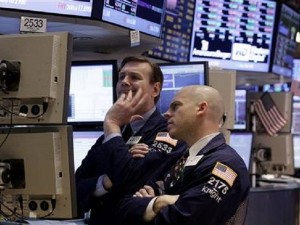US stocks chase European indexes lower

Specialists Patrick King, left, and Christopher Carella work on the floor of the New York Stock Exchange Tuesday, May 8, 2012. Stocks appear to be headed to open lower with Dow Jones industrial futures down 0.3 percent and S&P 500 futures down 0.5 percent. AP/Richard Drew
NEW YORK – Fear of European debt is once again playing havoc with Wall Street.
Stocks and commodities pitched down Wednesday in the United States as borrowing rates climbed for Spain and Italy, a sign that investors are losing confidence in those countries’ finances.
Spain’s 10-year borrowing rate leapt to 6.06 percent from 5.70 percent early Tuesday. Many fear that Spain, strangled by high unemployment and a real estate collapse, could be the next nation to require financial rescue.
The Dow Jones industrial average was down as much as 184 points before recovering most of the loss. It was down 30 points by early afternoon, still on the verge of its longest losing streak since last summer.
The Dow climbed 25 percent from Oct. 3 through May 1 as the debt crisis in Europe appeared to calm down. Last fall, nations that use the euro agreed to enforce budget discipline across the region.
Article continues after this advertisementThe Dow closed at a four-year high on May 1. Since then, worries about Europe have resurfaced, this time because Greek and French voters ousted leaders who had imposed tough spending cuts to soothe investors.
Article continues after this advertisementGreece, without a government since Sunday’s elections, appears increasingly likely to exit the euro currency union or be forced out. The resulting uncertainty could cause turmoil throughout global markets.
The spring decline has become a motif on Wall Street. In 2010 and 2011, the Dow climbed in the first three months of the year, then flat-lined or lost ground as events overseas overshadowed modest economic growth in the US
The market today is is tame compared with last summer, when the Dow routinely swung by hundreds of points a day. But the atmosphere is starting to resemble last year’s as traders sell anything deemed risky based on the latest headlines from Europe, said Peter Tchir, who trades a range of investments for his hedge fund TF Market Advisors.
“The concern in Spain is at such a high level that people trade the indexes or big futures contracts and are less discriminating about what risk they’re taking on,” he said.
On Wednesday, prices fell for commodities such as energy, copper and silver that are needed to sustain broad economic growth but are less valuable when the economy is weaker and demand wanes.
Benchmark crude oil, which sold for about $110 per barrel earlier this year, fell below $100 last week and kept sliding. It traded around $96 on Wednesday on the New York Mercantile Exchange.
Commodity prices also were under pressure because the dollar rose against the euro, sending the euro down to $1.2910, its lowest point since Jan. 23. Commodities are traded in dollars, so a strong dollar makes them appear more expensive to investors who hold foreign currencies.
European stocks are having one of their worst weeks in months. London’s FTSE 100 index is down 2.2 percent this week, its worst performance since December. Stocks in Athens are down 10.8 percent, the most since August.
Cash flowed into ultra-safe investments such as US Treasurys, pushing the yield on the 10-year note as low as 1.80 percent, near a seven-month low.
One reason that demand for Treasurys is increasing: As Europe deteriorates and hiring in the US slows, traders believe that the Federal Reserve is more likely to engage in another round of bond-buying to juice the economy.
Bond-buying by the Fed lowers bond yields, pushing more cash into stocks and commodities. When traders expect the Fed to act, they buy bonds to take advantage of the extra demand that the Fed’s buying will create.
Economic indicators and corporate earnings in the US continue to signal recovery, albeit a choppy one. The government said after trading began that US wholesale stockpiles grew in March at their slowest pace in four months, a sign demand is too weak for companies to ramp up production.
The Standard & Poor’s 500 index and Nasdaq composite were both well off their lows for the day. The S&P fell two points to 1,361. The Nasdaq composite index dropped four to 2,942.
Tchir expects the market to grow more volatile as traders track deadlines for indebted European nations to repay bond investors or raise cash. For investors who benefited from the recent rally, he said, “I think it’s time to take money off the table.” There’s too much of a disconnect between the Dow’s recent four-year high and European markets that are scraping three-year lows, he said.
European stocks rose into the close, recovering some earlier losses. Indexes in France and London closed down less than 1 percent after steep losses earlier.